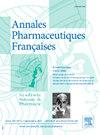Advanced stability-indicating RP-HPLC method for the quantification of lurasidone hydrochloride in bulk and PLGA-based in situ implant formulation
IF 1
Q4 PHARMACOLOGY & PHARMACY
引用次数: 0
Abstract
Objectives
The aims of the present investigation was to develop and validate stability-indicating RP-HPLC method for the estimation of Lurasidone hydrochloride (LURA-H) followed by its drug product, LURA-H encapsulated poly-D,L lactic-glycolic acid (PLGA) based in situ depot forming implant (LURA-H-PLGA-ISI).
Methods
The LURA-H-PLGA-ISI formulation was developed by simple mixing method. According to international conference on harmonization guidelines, RP-HPLC method was developed and validated using Waters 2695 and discovery C18, 5μ, 250 × 4.6 mm ID column. Force degradation studied were performed by various degradation techniques.
Results
The chromatographic separations of LURA-H as well as LURA-H-PLGA-ISI with good resolutions have been achieved using the mobile phase 0.1% orthophosphoric acid and acetonitrile (50:50). The linearity in the range of 25–150 μg/mL of developed method. LOD and LOQ limits for LURA-H were found to be 0.07 μg/mL and 0.22 μg/mL, respectively. The % RSD was found to be < 2% showing the precision of developed method. The accuracy of developed method was demonstrated which is close to 100 ± 2%. Little modifications in the chromatographic conditions indicated robustness of the developed method. Further, solution stability of LURA-H and LURA-H-PLGA-ISI was stable at room temperature. Furthermore, force degradation studies demonstrated LURA-H was unaffected and stable under thermal, photodegradation and neutral (hydrolytic) stress conditions. AGREE and GAPI assessment demonstrated the developed method is environmentally sustainable.
Conclusion
The developed method is simple, robust, precise, accurate and sensitive which can be utilized for the regular analysis of LURA-H in quality control laboratories of bulk drug substance and PLGA containing formulations of LURA-H.
Objectifs
Les objectifs de cette étude étaient de développer et de valider une méthode CLHP indicatrice de stabilité pour l’estimation du chlorhydrate de lurasidone (LURA-H) et de son produit médicamenteux, l’acide poly-D,L lactique-glycolique encapsulé LURA-H. (PLGA) implant formant dépôt in situ (LURA-H-PLGA-ISI).
Méthodes
La formulation LURA-H-PLGA-ISI a été développée par une méthode de mélange simple. Conformément aux directives de la conférence internationale sur l’harmonisation, la méthode CLHP a été développée et validée à l’aide d’une colonne Waters 2695 et Discovery C18, 5 μ, 250Å∼4,6 mm ID. La dégradation forcée a été réalisée sous plusieurs conditions stressées.
Résultats
Les séparations chromatographiques de LURA-H ainsi que LURA-H-PLGA-ISI avec de bonnes résolutions ont été réalisées en utilisant la phase mobile 0,1 % d’acide orthophosphorique/acétonitrile (50:50). La linéarité a été valisée entre 25 et 150 μg/mL. Les limites de détection (LOD) et de quantification (LOQ) pour LURA-H sont respectivement de 0,07 μg/mL et 0,22 μg/mL. Le % RSD s’est avéré < 2 %, ce qui montre la précision de la méthode développée. La précision de la méthode développée a été démontrée et est proche de 100 ± 2 %. De petites modifications dans les conditions chromatographiques ont validé la robustesse de la méthode développée. De plus, les solutions de LURA-H et de LURA-H-PLGA-ISI était stable à température ambiante. De plus, des études de dégradation forcées ont démontré que LURA-H n’était pas affecté et stable dans des conditions de contrainte thermique, de photodégradation et de contrainte neutre (hydrolytique). Les évaluations AGREE et GAPI ont démontré que la méthode développée est écologiquement durable.
Conclusion
La méthode développée est simple, robuste, précise et sensible. Elle peut être utilisée pour l’analyse régulière de LURA-H dans les laboratoires de contrôle qualité des substances médicamenteuses en vrac et des formulations de LURA-H contenant du PLGA.
先进的稳定性指示 RP-HPLC 方法,用于定量检测散装和基于 PLGA 的原位植入制剂中的盐酸鲁拉西酮。
研究目的本研究旨在开发并验证用于估算盐酸拉西酮(Lurasidone hydrochloride,LURA-H)及其药物产品--LURA-H包裹聚D,L乳酸-乙醇酸(Poly-D,L lactic-glycolic acid,PLGA)原位去势植入物(LURA-H-PLGA-ISI)的稳定性指示RP-HPLC方法:LURA-H-PLGA-ISI配方是通过简单的混合方法研制而成的。根据国际协调准则,使用 Waters 2695 和 discovery C18、5μ、250×4.6 mm 内径色谱柱建立并验证了 RP-HPLC 方法。采用多种降解技术对其进行了降解研究:使用流动相 0.1%正磷酸和乙腈(50:50)对 LURA-H 和 LURA-H-PLGA-ISI 进行了色谱分离,并获得了良好的分辨率。所开发的方法在 25-150 μg/mL 范围内线性良好。LURA-H 的最低检测限和最低定量限分别为 0.07µg/mL 和 0.22 µg/mL。RSD %为结论:所开发的方法简单、稳健、精确、准确、灵敏,可用于原药和含 PLGA 的 LURA-H 制剂质量控制实验室中 LURA-H 的定期分析。
本文章由计算机程序翻译,如有差异,请以英文原文为准。
求助全文
约1分钟内获得全文
求助全文
来源期刊

Annales pharmaceutiques francaises
PHARMACOLOGY & PHARMACY-
CiteScore
1.70
自引率
7.70%
发文量
98
期刊介绍:
This journal proposes a scientific information validated and indexed to be informed about the last research works in all the domains interesting the pharmacy. The original works, general reviews, the focusing, the brief notes, subjected by the best academics and the professionals, propose a synthetic approach of the last progress accomplished in the concerned sectors. The thematic Sessions and the – life of the Academy – resume the communications which, presented in front of the national Academy of pharmacy, are in the heart of the current events.
 求助内容:
求助内容: 应助结果提醒方式:
应助结果提醒方式:


